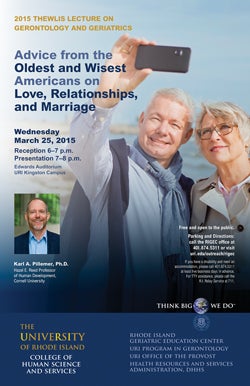Staying Power
 At the next family gathering, you might want to turn to a grandparent for advice about how to put a spark back in your marriage—or deal with meddlesome in-laws.
At the next family gathering, you might want to turn to a grandparent for advice about how to put a spark back in your marriage—or deal with meddlesome in-laws.
Karl A. Pillemer, one of the country’s leading gerontologists, spoke at URI for the annual Thewlis Lecture on Gerontology and Geriatrics in March, using insights based on thousands of interviews he conducted for his latest book, 30 Lessons for Loving.
He spoke with URI:
What was the number one tip from long-married couples?
First, that marriage for a lifetime is hard. To stay married for life requires resilience, spirit, and discipline. It also requires an acceptance of predictable stressors and unexpected difficulties. But the good news is, it’s worth it. A long marriage provides some of the most splendid emotional experiences life offers.
What did older Americans say about the adage “never go to bed angry’’?
Almost everyone used that phrase. There is a deep meaning behind it: that nothing puts out the spark as much as long, simmering anger. This is the kind of insight that comes from being at the finish line, looking back.
You mention that in-laws can have a big impact on a marriage. Who comes first: spouse or in-laws?
The elders were unequivocal about this one: if there is conflict between your family and your spouse, side with your spouse. Many elders had in-law difficulties, and this rule got them through it.
What did older Americans tell you about keeping the spark alive?
They wanted young people to know that the idea of the “sexless older years” is a myth. Indeed, those married a half-century or more described intimacy as better in some ways than when they were in the midst of jobs, child-rearing, and other stressors. For them, intimacy does broaden to include the pleasure of touch, holding one another, and other forms of closeness.
 Home
Home Browse
Browse Close
Close Events
Events Maps
Maps Email
Email Brightspace
Brightspace eCampus
eCampus


